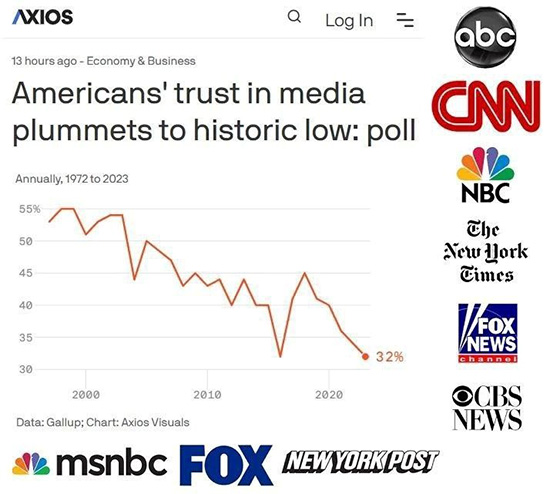
Studies show that distrust of the media has only deepened in these recent years of political polarization. No longer are news organizations widely considered credible sources of objective and accurate information. Instead, they’re looked at with suspicion, with consumers wondering if what they’re hearing or reading is true or made up, fair or slanted. And while some groups are more suspicious than others, an increasing number of people are questioning the truth of what they’re hearing, watching and reading.
According to a Pew Research Center survey of adults in summer 2022, just 61% of Americans said they had some or a lot of trust in the information they get from national news organizations. That’s a significant drop from the 76% of adults who felt that way in 2016.
The youngest adults surveyed, those aged 18-29, had the least amount of trust in the national news — just 56%. The oldest Americans, those 65 and over, had the most, at 67%.
Local news organizations fared better in the Pew survey, but they also saw declining faith in their products. Among all adults, 71% said they had some or a lot of trust in the information they got from their local news outlets. But that was also a big drop from just six years ago, when 82% said they trusted their hometown news.
According to a report by the nonpartisan Aspen Institute, which in 2017 formed a commission to examine trust in the media, there are six major reasons for this decline.
The first cause is the proliferation of news sources, from cable news channels to a dizzying number of internet “news” sites. This paradox of choice has actually made it harder, not easier, for Americans to feel well-informed, according to the institute’s Knight Commission on Trust, Media and Democracy, a partnership with John S. and James L. Knight Foundation, which studied the topic for two years.
The commission cited a 2018 Gallup poll that found only about 4 in 10 people were confident in their ability to “navigate the news environment to remain knowledgeable on current events and determine what is factually true.”
The second reason is the public’s loss of connection with the media source that created the news story. News stories once consumed in newspapers, magazines or on a particular channel are now often funneled to consumers through internet platforms rather than actual sites of news organizations, the commission noted. This has made it harder for consumers to differentiate between “good” journalism produced by experienced reporters from stories based on rumors or falsehoods, creating distrust with all of it.
A third factor has been the blurring of lines between news and opinion in the media, the commission found. This blurring took off with the 1987 repeal of the Federal Communication Commission’s Fairness Doctrine, a Reagan administration decision that opened the door for endless partisan commentaries on talk radio and 24-hour cable network shows. “The consensus on what constitutes ‘the news’ began to erode,” the commission report said. More recently, it added, conservative media have attacked “mainstream media” as being inherently biased toward the left.
Perhaps one of the greatest factors that has chipped away at public trust of the media, however, has been the widespread dissemination of false or misleading information. Of course, propaganda intended to influence attitudes and even win votes is nothing new to American society. But the “internet, with its radical openness, has introduced new forms of problematic content,” according to the commission. That ranges from troubling but often harmless misinformation to the more serious disinformation, which is knowingly sharing false information intended to cause harm.
A fifth reason so many Americans distrust the news media, according to the commission, is the decline of local news organizations. More people trust local news sources than national ones. That’s likely because consumers feel a higher level of accountability from news produced close to home. But as local news outlets have shut their doors, consumers haven’t connected with out-of-reach national sources.
Finally, the commission identified the growing practice among the public, as well as pundits and politicians, to politicize criticism of the media. Americans tend to be more critical of “the media” rather than “my media,” the news sources one goes to for his daily diet of partisan commentary.
read more in our Telegram-channel https://t.me/The_International_Affairs

 10:57 24.06.2024 •
10:57 24.06.2024 •






















